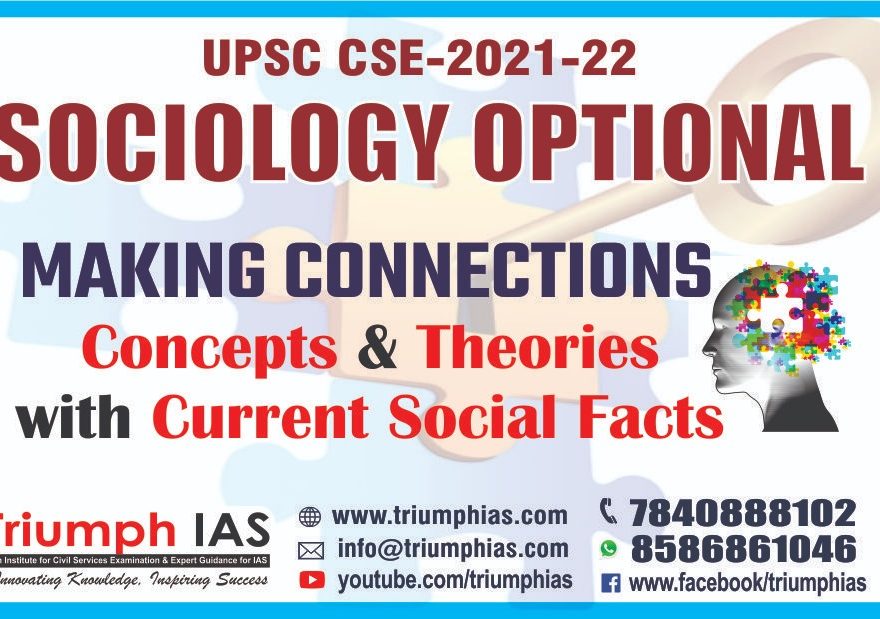Relevance: Sociology: Paper I: Sociological thinkers: Karl Marx: Historical materialism, mode of production, alienation, class struggle.
Conflict theory in sociology describes society’s tendency to change and develop due to perpetual conflict between classes. It is one of the four paradigms of sociology, which include functionalism, symbolic interactionism, and feminism. Examples of social conflict theory can be found in a variety of situations.
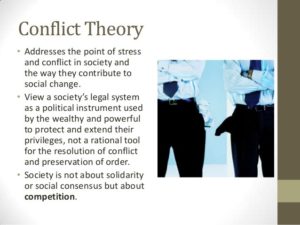
Origin and History of Conflict Theory
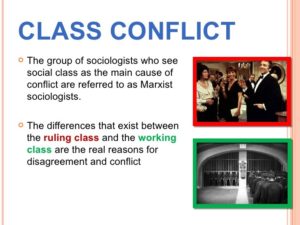
The 19th-century philosopher and revolutionary Karl Marx saw society broken into two classes: the proletariat (working class) and bourgeoisie (owners of the means of production).
To Marx, societal conflicts arise due to competition for limited resources in an economy, leading to an eventual revolution and/or war. Ruling classes kept working classes in states of oppression with hegemony, which imposed dominance with social rules that all obeyed.
Political economist Max Weber extended this definition to include multidimensional class levels, such as those based on race, gender, and religion. He believed that in addition to political revolution, social conflict and change can result from discourse and the exchange of ideas.
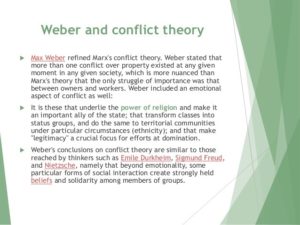
Real-Life Examples of Conflict Theory
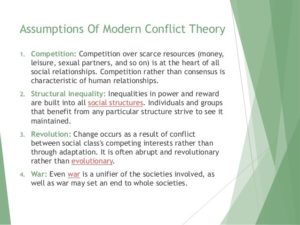
Patterns of class conflict theory occur when one class of people is systemically empowered over another. The less empowered class demands a share of resources that the more fortunate class has in abundance, leading to social conflict. Here are some real-life examples of conflict theory in both economic and societal situations.
Occupy Wall Street
Part of the backlash following the 2008 economic crisis, Occupy Wall Street was a two-month political protest on Wall Street, New York. Its slogan, “We Are the 99%,” referred to the increasing wealth and income discrepancy between the wealthiest 1% of the population and the rest of the country. Time Magazine named “The Protester,” both international protesters and those involved with Occupy Wall Street, as its 2011 Person of the Year.
The Education System
Inherent tracking systems in the public education system create their own class stratification. Gifted and advanced students (who are more likely to be
from families with time and financial resources that aid educational success) receive skills that prepare them for college and future careers.
Average-performing students and struggling students do not receive these same opportunities in their classes, which are often more focused on remediation and learning trades. If these students are able to make it to college, they will be economically disadvantaged due to student loans. This conflict has led to a national conversation about the affordability of college and the feasibility of canceling student loan debt.
The Criminal Justice System
Crimes committed by members of wealthier classes, such as powerful CEOs or celebrities, often receive less punishment than crimes committed by people of minority races or lower socioeconomic status. Marx maintained that because the definition of crime and criminality is dictated by those with societal power, the criminal justice system is another way to subjugate the working class while elevating the higher class.
#MeToo Movement
Another way for ruling classes to oppress others is to abuse the power they hold over women and men in subordinate careers. The MeToo movement, which began in 2006 and had a social media resurgence in 2017 as #metoo, identified how widespread the issue of workplace sexual abuse and harassment had become. This type of social revolution reflects the inevitability that both Marx and Weber predicted when writing about conflict theory.
Race and Black Lives Matter
Sociologist W.E.B. Dubois explored double-consciousness, which is the sensation of having two identities (in his case, an American and a black American) that are treated differently. Through his formation of Racial Formation Theory, Dubois maintained that racism in America was systemic – and that an individual racist was not needed to maintain the discriminatory system.
Black Lives Matter is a social movement that protests violence against black people. It began in 2013 after George Zimmerman was acquitted in the shooting death of Trayvon Martin. The movement’s supporters continue to demonstrate when black people are killed in situations that are perceived to be non-threatening.
Like the civil rights movement that came more than 60 years before, Black Lives Matter is another example of a social revolution after years of unequal treatment.
Criticism of Conflict Theory
Though conflict theory is the basis of several subsequent theories in sociology, including race conflict theory and critical theory, it has its share of criticism. Modern criticisms of conflict theory include:
- It focuses on conflict to the exclusion of stable economies and societies.
- Scientific research on interpersonal conflict is lacking.
- There is a limited ability to extend conflict theory into a microeconomic scale, including family systems.
- It often excludes intersectionality, which describes the network of attributes that make up a person’s identity.
- Conflict theory discounts positive societal trends, such as humanitarianism and acts of peace.
- It does not include individuals who move into upper social classes through means of merit or skill (e.g., educational advancement, sports careers, career promotion, etc.).
APPLICATION OF CONFLICT THEORY
Conflict theory is studied even at this time to solve many problems in society. This theory acts as a key element in sorting many problems at a wide range. Some of the examples where conflict theory is applied are as follows:-
- By the different classes, environmental pollution is caused on some level. It is further studies on which scale every class affect pollution.
- The feminist theory came along with Conflict Theory. It studies how women are in general considered as lower than man. What can be the results if women place in society is always kept at a lower rank?
- Power has always been the factor determining Conflict Theory. So this theory also studies how power affects Capitalism factor on a global scale. This theory researches the inequalities present in Capitalism.
- Words which have escaped somebody mouth cannot get back. So the words play a vital role in the conflict part of any society. Many times a person says something else and his meaning is taken otherwise. So the word importance is also studied under the application of Conflict Theory.
Karl Marx and weber were indeed the major contributors of Conflict theory under Sociology but then some sociologist in recent times have also done a tremendous job at modifying it for better.
MODERN VIEW OF CONFLICT SOCIOLOGY
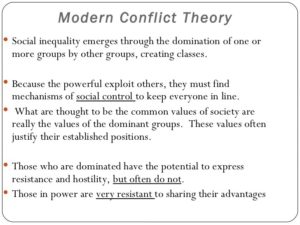
The founder of the Modern view of Sociology is C. Wright Mills’ stated that the difference lies because of the different resources.
Gene Sharp in 1928 asserted much on the fact there should be a non-violent approach towards conflicts. This was followed by Gandhi in India when he was adamant to remove British people from India.
In 1983 he discovered Albert Einstein institution which was fully dedicated to education and promoting non-violent actions in conflicts side by side. Recent examples where this study was given appraisal and followed as well as our Youth Movement in Tunisia, Protest Movement which covered President Mubarak of Egypt.

